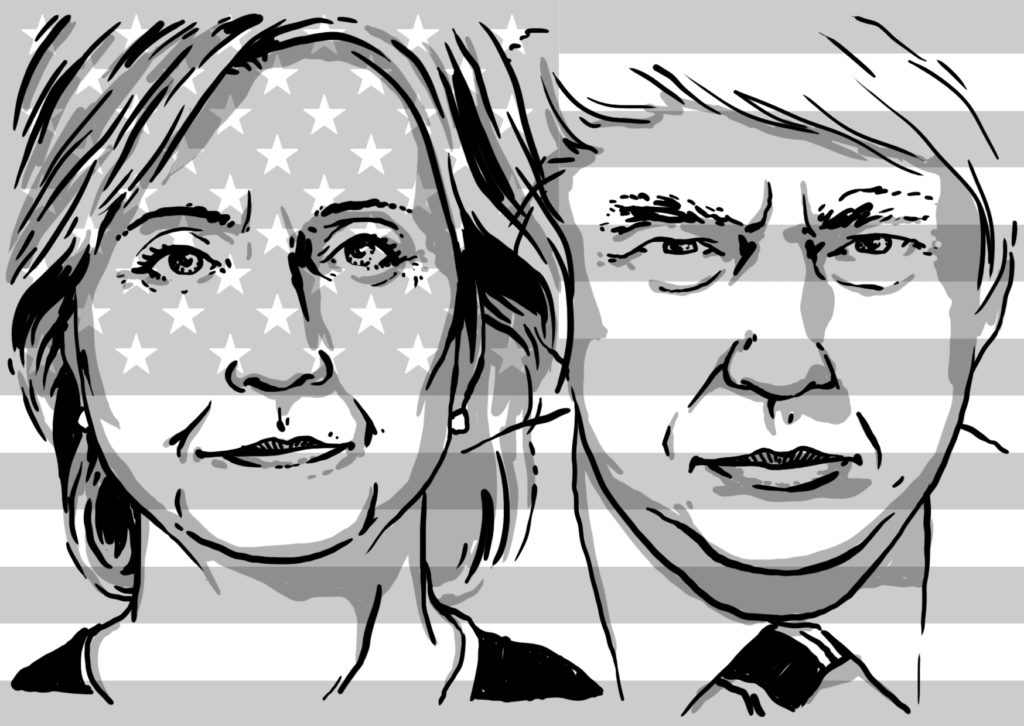Executive Editor Klara Marie Schroeder interviews Hertie School of Governance Professor Yannis Theocharis on the unprecedented role of social media in this year’s US Election.
Social Media has played an unprecedented role in this year’s US election campaign. Who do you think is more adept at using it – Hillary Clinton or Donald Trump?
Both candidates have dedicated staff who handle their social media accounts. This implies that for each team, there are specific strategies for posting, involving both when to post and what to post. This said, we know for a fact that Trump does post a lot of content himself, without consulting his advisors, while for Clinton we may or may not believe that the tweet is coming from her when she signs off with her initials. At the personal level, therefore, Trump has shown to have a greater understanding of the power of social media with his major weapon being, undoubtedly, Twitter. Trump’s use of Twitter appears to have constructed the image of a more “real” and “straightforward” politician who is interested in being in immediate touch with his supporters and speaking his mind. This creates a kind of intimacy, which, at a time of declining trust in political institutions, has proved precious. However, his social media team has had to do substantial damage control after control that he published erratically and without their input.
Citizens increasingly gain information through social media rather than traditional media outlets such as newspapers. How is this influencing political discourse?
It is true that an increasing number of citizens consume news on social media, although there are significant cross-country differences when it comes to consumption preferences (in Germany, for example, social media lag very far behind the TV and the printed press which are still by far the most important sources for news). Moreover, when it comes to social media news consumption, this tends to come through the online portals of well-known news outlets. Now, some people think that social media promote so-called filter bubbles and echo-chambers, eventually leading to greater polarisation of the political discourse. It is, however, difficult to say if this is the case when most evidence shows that people tend to stick to their pre-existing information consumption preferences when they are online in those venues. Some strengthening of pre-existing views, leading to polarisation, may be happening, but so is the adoption of new points of view through accidental exposure to diverse information.
Do you think social media inherently promotes a more confrontational conversation style?
No, I don’t think that the venues themselves promote confrontation, although the (mis)affordances of some of these platforms make it easier. If you access the comments of an online newspaper article, for example, you will see much confrontation there too, which means that it’s probably a by-product of anonymity. Moreover, I think it also depends on the platform. In some platforms where the costs of posting something are minuscule and users can remain anonymous, a more confrontational style can be easily and quickly adopted than in others. Facebook, for example, seems to promote a more polite and civil conversational style than Twitter. It should also be noted that in platforms with moderators, confrontations that seem to be getting out of hand can be easily soothed or dealt with.
Hillary Clinton is often criticised for her “inauthentic” use of social media. Authenticity was previously not a trait necessarily expected from politicians. Do you think social media has shifted our perception of what constitutes good leadership?
There are different questions here: Regarding authenticity it depends on how you define it. Given that most politicians have specialist staffers that deal with social media accounts, being inauthentic is not a feature unique to Hillary Clinton. Also, it turns out that being authentic in the sense of writing your own tweets without consultation with your staffers – may be a poor strategy from a political communication point of view because it can lead to loss of control and do significant damage to a politician or candidate (as in Trump’s case). As for whether social media has shifted our perception of what constitutes good leadership: I do not think this is the case – I don’t see the mechanism behind such an idea. It may be true that people expect leaders to have a presence on social media nowadays, but connecting it with people’s perception of good leadership seems a bit far-fetched.
What is the relationship between TV and social media? Are they competing or complementing each other?
Social media complement TV. Regardless of whether we are talking about entertainment (e.g. watching a movie/series) or politics (e.g. a leaders’ televised debate), social media are usually used simultaneously, for live commenting, and or information-seeking while an event is unfolding. This phenomenon is becoming increasingly common among especially young people, and has even been given the name: “dual” or “second” screening.
Policy-making is a complex process, yet social media embraces simple messages. How can politicians use social media to engage the public without oversimplifying important topics?
Again it depends on the platform. A politician can provide a full elaboration of her/his position on a Facebook post but only a one-liner on Twitter. If a long-winded post with all the necessary details required for avoiding oversimplification appears on Facebook, is anyone but the most devoted going to read it? Probably not. On the other hand, a snap sentence on Twitter not only has the chance to bring a message home in a way that most followers’ supporters can remember it, but it offers two concrete benefits to the politician: (a) greater control over the content and (b) strategic ambiguity in a policy position or statement. In short, it seems to me that some simplification is necessary both for catching and keeping the public’s attention and interest. In many ways, this is why Trump has been so successful. Studies examining his speeches have shown that his analytic capacity and complexity of argumentation is far inferior to that of his Democrat or Republican opponents. This has not prevented him from becoming far more popular on social media than they did, by using easily digestible one-liners.

Yannis Theocharis is Research Fellow at the Mannheim Centre for European Social Research, University of Mannheim. He holds an MSc degree from the London School of Economics and Political Science, and a PhD from University College London. His research interests are in political behaviour, social networks, new media political communication and social capital. He has published extensively on these topics in political science, communication and interdisciplinary journals and his work has appeared in several edited volumes on social media, politics and methods. Yannis was previously Alexander von Humbodlt postdoctoral fellow at the University of Mannheim and co-director of the MZES project Social Media Networks and the Relationships between Citizens and Politics. He enjoys conributing articles to newspapers and democratic fora like opendemocracy.org and in 2012 he was a TEDx speaker.
 Klara Marie Schroeder is Executive Editor of The Governance Post and a second-year public policy student at the Hertie School of Governance.
Klara Marie Schroeder is Executive Editor of The Governance Post and a second-year public policy student at the Hertie School of Governance.
